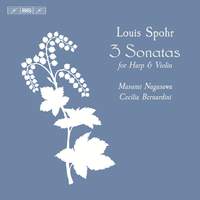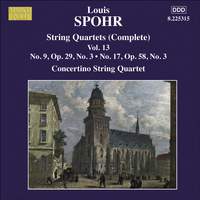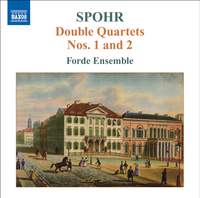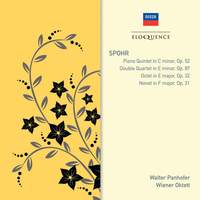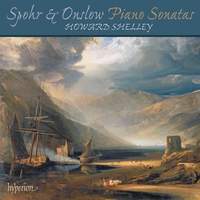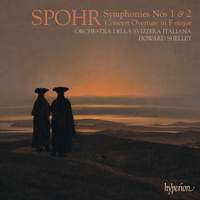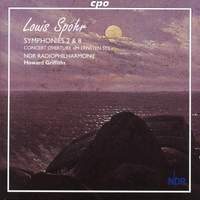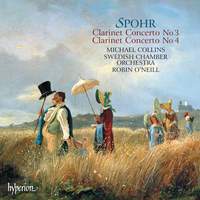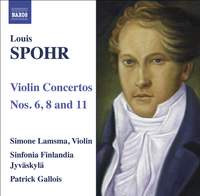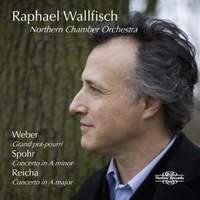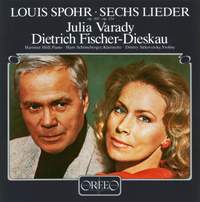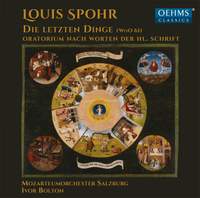Favourites,
Louis Spohr (1784-1859)

Louis Spohr, whose 240th birthday fell on April 5th this year, might be less well-regarded today as a composer than he was in his own lifetime, but even musicians who will never play a note of Spohr in their entire career owe him a considerable debt. He’s credited with having invented both the violin chinrest - a response to increasing levels of virtuosity in writing for the instrument - and the rehearsal mark, enabling more complex and extended works to be broken down into coherent chunks for practice. What’s more, he helped popularise the modern conductor’s baton, and his pedagogical works on violin technique (including the then-novel spiccato) were standard texts for many years after his death.
He was also of course a prolific and inventive composer, likened by some to ‘another Weber’ and numbered among those who helped chart the transition from Classical to Romantic conceptions of music. His primary instrument was the violin, and it shows in his output - with eighteen concerti for the instrument, as well as thirty-six string quartets, and occasionally adding the violin into his art songs just for good measure.
Spohr was born in Braunschweig, in what is today part of Niedersachsen in central Germany, but at the time (pre-unification German political geography being what it is) was a scrappy patchwork of disparate territories rejoicing in the memorable name of the Principality of Brunswick-Wolfenbüttel. As with so many successful composers, a musical and encouraging family life, with a singer-pianist mother and a flautist father, set him on a promising track. He also seems to have been blessed with a good eye for the visual arts - a portrait of him that’s often seen on album covers and concert programmes featuring his music was in fact painted by Spohr himself.

The young Spohr was something of an entrepreneur, though at this stage not a particularly competent one; aged just fifteen he attempted to put on an ambitious concert tour, which fell apart through poor planning. Given his youth, this is perhaps not surprising. Still, Spohr remained resourceful, giving a recital for the Duke of Brunswick in a bid for a financial bailout. The success of this gambit landed him a job as a chamber musician on the ducal staff.
His career rarely led him outside the borders of modern-day Germany (and indeed his fame was likewise mostly confined to German-speaking regions), with a breakout concert appearance in Leipzig leading to a period leading an orchestra in Gotha, in today’s Thüringen. There he met his future wife, a harpist and singer named Dorette Scheidler. Their marriage seems to have been happy; initially they formed a musical duo of equals, with Spohr writing works for violin and harp for them to perform together, though in later years Scheidler hung up her instrument in order to raise the couple’s children.
In the early years of the nineteenth century, Spohr met Beethoven - and it has to be said, he seems to have been fairly ambivalent about the slightly older composer’s musicianship. Comments that survive from Spohr suggest in particular that he did not rate Beethoven’s piano technique highly, describing it as ‘harsh’ and ‘careless’. Still, the two formed something of a personal friendship, working together as amicable colleagues in Vienna during Spohr’s tenure of the conductor post at the Theater an der Wien.
Despite his seemingly influential post, Spohr’s attempts to have his operas put on in Vienna bore no fruit; not until he moved to a directorial position in Frankfurt was he really able to start staging them, and they enjoyed considerable success (though rapidly fell out of fashion after his death). His final post, brought about in part by a proposal by Weber, was at the court at Kassel, in what is today north-eastern Hesse - once again returning to his central German origins.
The final years of Spohr’s life were filled with misfortunes; in 1857 a dispute with his employer at Kassel led to him forcibly being pensioned off against his will, and shortly thereafter a broken arm ended his impressive violin career. He died two years later.
Although Spohr’s reputation today is eclipsed by his contemporaries (chiefly, of course, Beethoven), his music has never been wholly forgotten and continues to enjoy a fair degree of popularity. In the 2000s and 2010s the Marco Polo label produced a complete series of his string quartets, and his violin and clarinet concertos remain popular among soloists seeking to offer audiences something a little different.


Louis Spohr (1784-1859)
Curated by David Smith
A selection of some of the best recordings of music by the early Romantic violin innovator - composer of eighteen violin concertos, thirty-six string quartets and more, and developer of two invaluable musical inventions: the chinrest and the rehearsal mark. 4 hours 49 minutes
'Given the two instruments involved, the overall mood here is largely one of serenity. There is, though, plenty of sparkle, joyfully explored by the excellent Nagasawa and Bernardini.' (BBC Music Magazine, October 2018)
Available Formats: SACD, MP3, FLAC, Hi-Res FLAC
'This is volume 13 of the complete quartets (there are more than 30 of them). Op. 58, No. 3 (1822), played with vigour and warmth by the Moscow-based Concertino Quartet, is an attractive and interesting piece, with a finale ingeniously combining a G major allegro and a G minor adagio, which, surprisingly, has the last word.' (The Sunday Times, 22nd March 2009)
Available Formats: CD, MP3, FLAC
'Enjoyable, educational, engaging. Not quite "background" music = demands quality listening, sometimes has arresting chromatic sections. Made me want to hear more of Spohr's oeuvre.' (eBay product review from user 'joyfulgent', 4th March 2013)
Available Formats: CD, MP3, FLAC
'Spohr at his best...The colourful Octet is lively, its notoriously testing violin part admirably unflustered.' (BBC Music Magazine, Christmas 2010)
Available Formats: MP3, FLAC
'Shelley plays this music with consummate artistry, making light of its technical difficulties and investing it with all the Romantic charm and ardour it needs. It's captured in excellent quality sound.' (BBC Music Magazine, November 2012)
Available Formats: CD, MP3, FLAC, Hi-Res FLAC
'The first two symphonies … are well worth an airing, and their finales in particular have a great deal of life … Howard Shelley’s direction is highly effective.' (Manchester Evening News)
Available Formats: MP3, FLAC
'These two symphonies reveal Spohr as a thoroughly accomplished composer. The music always moves along with a sure sense of direction, and if there is a criticism to be made it is that the ideas themselves do not necessarily have a compelling personality.' (Terry Barfoot, MusicWeb)
Available Formats: MP3, FLAC
Spohr - Clarinet Concertos Nos. 3 & 4
Michael Collins (clarinet), Swedish Chamber Orchestra, Robin O’Neill
'Collins completes his recordings of these delightful concertos with the contrasting works presented here, both in minor keys (F and E, respectively). The F minor is the more brilliant of the two, and Collins dazzles like a bel canto diva in the pyrotechnic leaps, trills and runs, while he lavishes his rich tone, phenomenal breath control and deeply satisfying expressive insights on the E minor.' (The Sunday Times, 27th April 2008)
Available Formats: CD, MP3, FLAC
'Naxos’s program of Spohr concertos deserves a hearing for the young soloist’s bravado tempered with sensibility as well as for the orchestra’s generally sympathetic and competent accompaniment.' (Robert Maxham, Fanfare)
Available Formats: CD, MP3, FLAC
Raphael Wallfisch plays Spohr, Reicha, Danzi & Weber
Raphael Wallfisch (cello), Northern Chamber Orchestra, Nicholas Ward (artistic director & leader)
'The virtues of this disc really centre around the music and Wallfisch's advocacy. Spohr's Violin Concerto in Friedrich Grützmacher's adaptation is a worthy addition to the repertoire which, with the other works, forms an attractive, versatile collection.' (Gramophone, April 2011)
Available Formats: CD, MP3, FLAC
'Dietrich Fischer-Dieskau himself included songs by Spohr in his recitals very early on and finally in 1984 chose to devote a full album to him, forgotten gems from his great series for Orfeo. He deifies the suggestive wonders (Erlkönig!) of Op. 154, where the diction recalls ancestral ballads [...] who could do it better than him?' (Review from Jean-Charles Hoffelé on clicmusique.com)
Available Formats: CD, MP3, FLAC
Spohr: Die letzten Dinge
Andrew Foster-Williams (bass), Jeremy Ovenden (tenor), Sally Matthews (soprano), Katharine Goeldner (mezzo-soprano), Mozarteumorchester Salzburg, Salzburger Bachchor, Ivor Bolton
'Haydn’s oratorios and the ceremonial scenes from Mozart’s Die Zauberflöte were Spohr’s models...This new version, recorded live in Salzburg last year, is strongly conducted by Ivor Bolton, and there’s some particularly fine choral singing from the Salzburg Bach Choir.' (The Guardian, 11th September 2014)
Available Formats: CD, MP3, FLAC


